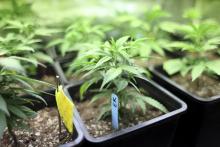
May 01 2017

In a previous article we discussed the potential impact of the R-v-Auton case ruling on your cannabis cultivation cases. This new article expands on some additional impacting factors.
Despite the suggested yield range in the Court of Appeal ruling, we regularly see expert police officers quoting a wider range of 28g to 90g. Whilst the adjusted upper end of this range is feasible in certain conditions, it is not the norm and an assessment of the growing facilities must be made to justify or refute such claims; police officers will rarely do this. Use of the higher end of the range can paint an unfair and misleading picture to the Court. As with the yield variances quoted by different forensic providers, which we discussed previously, we have had success in redressing these police expert claims and can provide alternative, realistic yield estimates which are accepted by Courts.
It is also recommended that careful consideration is given to the application of the sentencing guidelines for cannabis cultivation cases. Basing such guidelines on plant numbers for categories 3 and 4 can be misleading, as this also relies on the production of a typical yield. As such, the plant numbers are only part of the story. Whilst plants numbers are not suggested for categories 1 and 2, the same principles apply. As above, the ultimate yield and scale of success should be appropriately assessed. These outputs are governed by a myriad of factors, many of which are often overlooked, including:-
Furthermore, if the growing arrangements are unusual, such as outdoor operations, or utilise unusual equipment or methodologies, conventional yield estimate approaches may not be appropriate and may well warrant closer consideration.
Cannabis production or cultivation charges often go hand in hand with PWITS charges. The appeal ruling in the case of R-v-Wright successfully argued the PWITS charge was not appropriate for immature plants which had not produced any harvestable material. In essence, how can an individual intend to supply something which does not yet exist? We take a similar approach when dealing with cases involving immature plants, for both yield and valuation purposes.
Our experts can advise on all of these, as well as potential value. To discuss your case further, please contact Julian Dunnill or Richard Brown at our Durham office on 0191 332 4999 or Sarah Morley at our Huntingdon office on 01480 432794.